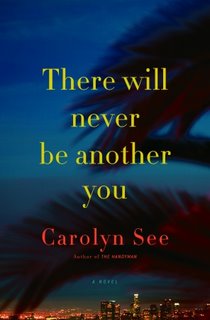preparing for dermatological disaster and dinner at the tennis club
 I was interested in reading There Will Never be Another You by Carolyn See for two reasons: 1) I got a free copy, and 2) it sounded from the jacket description like it might accomplish what I’ve been trying to do with my current project, which is take the family saga into the global world.
I was interested in reading There Will Never be Another You by Carolyn See for two reasons: 1) I got a free copy, and 2) it sounded from the jacket description like it might accomplish what I’ve been trying to do with my current project, which is take the family saga into the global world.The premise is this: Edith is a recent widow, the kind of narrator people might call “feisty,” which would make her want to smack them. She wants to maintain some dignity. She wants something to do after 7 p.m. Phil is her son, a UCLA Med Center dermatologist with a crappy family life he’s too lazy to do much about. One day Phil is recruited to be part of a semi-secret emergency response team—one that will respond to anthrax poisonings, urban Ebola outbreaks and the like. The directions he receives and the drills he practices are mysterious and seemingly ineffectual. If I came down with Ebola, I wouldn’t want Phil or his equally confused teammates taking care of me.
In a side plot, two UCLA students—Andrea, a pretty, blonde, Westside English major, and Danny, a built, tattooed, Chinatown English major—have sex in the bushes outside the hospital where their respective loved ones languish, and, when they’re not having sex in the bushes, navigate their cultural differences.
The book is something of a page-turner. Much of this owes to See’s quick-witted prose, but the offstage world events—which touch down briefly but frighteningly in the characters’ lives—made me search for the thriller that seemed to be lurking just around the corner.
When that thriller didn’t quite come, I found myself alternating between two possible conclusions: 1) That the characters were just privileged enough that messy things like terrorism never quite mattered as much as having a nice birthday dinner at the tennis club, or 2) that as small, weak, loving-and-loved humans we can’t help but think about terrorism and our birthday parties on the same scale. We bob around on the immense tide of war/politics/time—we see a wave looming above us once in a while—but there’s not much we can do.
So when the thriller didn’t materialize, I wasn’t disappointed.
It’s sort of a radical notion—to present a thriller at eye-level, where we’re stuck in the maze rather than viewing its intricate beauty from above. The book has the slightly off-kilter, near-future weirdness of some of See’s other writing (I haven’t read much, but now I plan to read more), but in this way it’s hardcore realism.



Comments